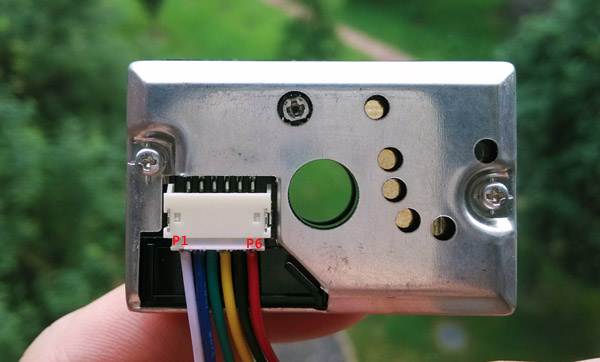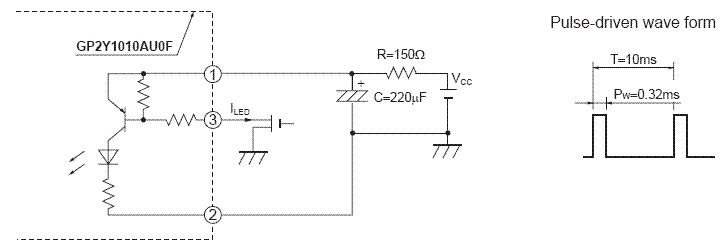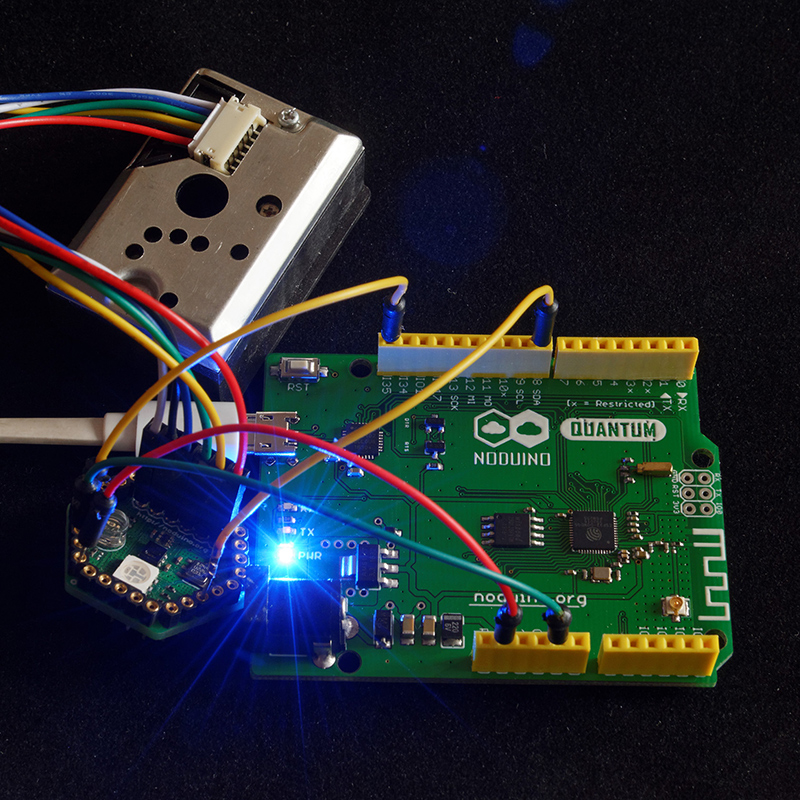ESP32 Partical
来自Jack's Lab
目录 |
1 Overview
Sharp GP2Y1010AU0F partical sensor
2 Connections
Sharp pin 1 (V-LED) => 150ohm resister => Quantum_VIN_3V3 Sharp pin 2 (LED-GND) => Quantum_GND Sharp pin 3 (LED) => Quantum_D8_IO22 Sharp pin 4 (S-GND) => Quantum_GND Sharp pin 5 (Vo) => Quantum_IO35 Sharp pin 6 (Vcc) => Quantum_VIN_3V3
3 Schemmatics
4 Quick Start
4.1 Build
$ sudo apt-get install git wget make libncurses-dev flex bison gperf python python-serial $ wget https://dl.espressif.com/dl/xtensa-esp32-elf-linux32-1.22.0-59.tar.gz $ mkdir -p toolchain $ tar zxf xtensa-esp32-elf-linux32-1.22.0-59.tar.gz -C toolchain $ export PATH=$PATH:`pwd`/toolchain/xtensa-esp32-elf/bin $ $ git clone --recursive git://github.com/icamgo/esp-idf.git $ export IDF_PATH=`pwd`/esp-idf $ cd esp-idf/examples/11_sharp_dust $ make menuconfig $ make -j2
4.2 Upload
$ make flash
You need to press the RST buttom after uploading the firmware into flash. If you guys do not like to do this please patch the /path/to/esp-idf/components/esptool_py/esptool/esptool.py :
diff --git a/esptool.py b/esptool.py
index 755f4cb..ff92c91 100755
--- a/esptool.py
+++ b/esptool.py
@@ -197,6 +197,12 @@ class ESPLoader(object):
+ '\xc0'
self._port.write(buf)
+ def reset_to_app(self):
+ self._port.setDTR(False)
+ self._port.setRTS(True)
+ time.sleep(0.05)
+ self._port.setRTS(True)
+
""" Calculate checksum of a blob, as it is defined by the ROM """
@staticmethod
def checksum(data, state=ESP_CHECKSUM_MAGIC):
@@ -1421,7 +1427,6 @@ def dump_mem(esp, args):
sys.stdout.flush()
print 'Done!'
-
def write_flash(esp, args):
"""Write data to flash
"""
@@ -1503,6 +1508,7 @@ def write_flash(esp, args):
if args.verify:
print 'Verifying just-written flash...'
verify_flash(esp, args, header_block)
+ esp.reset_to_app()
def image_info(args):
Then Quantum can reset to run your app automatically after uploading the firmware into flash
4.3 Checking Output
$ picocom -b 115200 /dev/ttyUSB0 ets Jun 8 2016 00:22:57 rst:0x1 (POWERON_RESET),boot:0x13 (SPI_FAST_FLASH_BOOT) ets Jun 8 2016 00:22:57 rst:0x10 (RTCWDT_RTC_RESET),boot:0x13 (SPI_FAST_FLASH_BOOT) configsip: 0, SPIWP:0x00 clk_drv:0x00,q_drv:0x00,d_drv:0x00,cs0_drv:0x00,hd_drv:0x00,wp_drv:0x00 mode:QIO, clock div:1 load:0x3ffc0008,len:0 load:0x3ffc0008,len:1964 load:0x40078000,len:3648 ho 0 tail 12 room 4 load:0x40080000,len:256 entry 0x40080034 I (243) heap_alloc_caps: Initializing heap allocator: I (243) heap_alloc_caps: Region 19: 3FFB1AFC len 0002E504 tag 0 I (244) heap_alloc_caps: Region 25: 3FFE8000 len 00018000 tag 1 I (254) cpu_start: Pro cpu up. I (260) cpu_start: Single core mode I (266) cpu_start: Pro cpu start user code rtc v118 Oct 19 2016 15:22:11 XTAL 40M I (302) cpu_start: Starting scheduler on PRO CPU. Welcome to Noduino Quantum Sharp GP2Y1010AU0F Particle Sensor Example... Sharp GP2Y1010AU0F Particle Sensor Example... Partical voltage = 0.49V Partical voltage = 0.49V Partical voltage = 0.64V Partical voltage = 0.57V Partical voltage = 0.58V Partical voltage = 0.51V Partical voltage = 0.57V Partical voltage = 0.60V Partical voltage = 0.56V Partical voltage = 0.58V Partical voltage = 0.54V Partical voltage = 0.47V Partical voltage = 0.67V Partical voltage = 0.57V ...... ......
5 Code Example
#include <stdio.h>
#include <stdlib.h>
#include "freertos/FreeRTOS.h"
#include "freertos/task.h"
#include "soc/rtc_io_reg.h"
#include "esp_system.h"
#include "nvs_flash.h"
#include "driver/gpio.h"
enum adc1_pad {
ADC1_GPIO36 = 0,
ADC1_GPIO37,
ADC1_GPIO38,
ADC1_GPIO39,
ADC1_GPIO32,
ADC1_GPIO33,
ADC1_GPIO34,
ADC1_GPIO35
};
enum adc1_atten {
ADC1_ATTEN_0DB = 0, /* 0 ~ 1V can be measured */
ADC1_ATTEN_3DB, /* 0 ~ 1.4V can be measured */
ADC1_ATTEN_6DB, /* 0 ~ 2V can be measured */
ADC1_ATTEN_12DB /* 0 ~ 4V can be measured */
};
uint32_t adc1_read(enum adc1_pad pad, enum adc1_atten att);
/*
* Read the amp adc, IO36 as the ADC_PRE_AMP
* make sure connecting a 270pF cap from
* esp32_pin5 to esp32_pin6
*/
uint32_t adc1_amp_read();
inline void delay_ms(int ms)
{
vTaskDelay(ms / portTICK_PERIOD_MS);
}
inline void delay_us(int us)
{
ets_delay_us(us);
}
void sharp_init()
{
/*
* Configure the IOMUX register for GPIO 22 (some pads are
* muxed to GPIO on reset already, but some default to other
* functions and need to be switched to GPIO. Consult the
* Technical Reference for a list of pads and their default
* functions.)
*/
gpio_pad_select_gpio(22);
/* Set the GPIO as a push/pull output */
gpio_set_direction(22, GPIO_MODE_OUTPUT);
/* power off the led of partical sensor */
gpio_set_level(22, 1);
}
int get_sharp()
{
uint32_t dust_vo = 0;
gpio_set_level(22, 0); // power on the LED
delay_us(280);
// read the dust value via ADC1 GPIO35 pin
dust_vo = adc1_read(ADC1_GPIO35, ADC1_ATTEN_6DB) / 4096.0 * 2.0;
delay_us(40);
gpio_set_level(22, 1); // turn the LED off
delay_us(9680);
return dust_vo;
}
void read_partical_task(void *pvParameters)
{
while (1) {
printf("Partical value = %2.2f\n", get_sharp());
vTaskDelay(8000 / portTICK_PERIOD_MS);
}
}
void app_main()
{
nvs_flash_init();
sharp_init();
printf("Welcome to Noduino Quantum\r\n");
printf("Sharp GP2Y1010AU0F Particle Sensor Example... \r\n");
xTaskCreatePinnedToCore(&read_partical_task, "read_partical_task", 1024, NULL, 5,
NULL, 0);
}
6 Reference
- For more information please refer to


